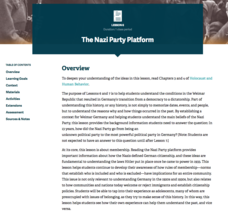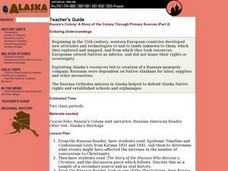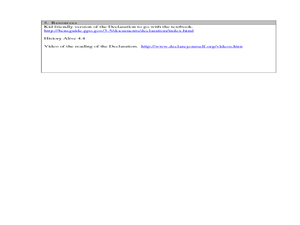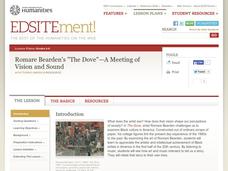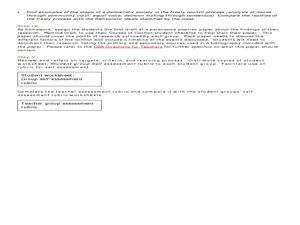PBS
Predicting/Making a Hypothesis
As an introduction to the hypothesis and testing method of investigation, young history detectives engage in a special investigation of a family artifact. After watching a short video that demonstrates the method, they develop a...
Facing History and Ourselves
The Nazi Party Platform
Not all party platforms stay democratic. A resource covers many political issues in Germany during the time of World War II, and teaches pupils about the Nazi party platform and what went wrong. Individuals participate in a warm-up...
Albert Shanker Institute
Dream Under Development
As part of their study of the 1963 March on Washington, class members do a side-by-side comparison of the original text of Martin Luther King's "I Have a Dream Speech" with a transcript of the speech he delivered. The take away from the...
City University of New York
Urban Politics: Machines and Reformers
What were political machines and whom did they serve? As part of a study of US immigration patterns and how these patterns influenced politics, groups investigate how Tammany Hall and other political machines gained support from voters.
NPR
Progressive Era Lesson Plan
The women working for equal rights in the early 20th century weren't a part of one large group; rather, they were members of dozens of small groups focused on social reform. Explore the ways groups in the Progressive Era like National...
Maryland Department of Education
The Concept of Diversity in World Literature Lesson 9: Debating Imperialism
To gain an understanding of Imperialism, class members read Rudyard Kipling's poem, "The White Man's Burden" and Mark Twain's essay, "To the Person Sitting in Darkness." Groups compare these perceptions of non-white cultures with the...
C-SPAN
The Electoral College and the Constitution
What is the purpose of the Electoral College? Is it antiquated, or does it have a place in today's political climate? High schoolers view a series of video clips as they analyze the parts of the United States Constitution that address...
Curated OER
Russia's Colony: A Story of the Colony Through Primary Sources (Part 1)
Students review the Russian American Timeline connected to the Russia's Colony unit narrative.
Curated OER
Russia's Colony: A Story of the Colony Through Primary Sources
Students read "Epidemic Timeline and Confessional Lists from Katmai 1831 and 1845." They construct a picture of life in Alaska during the Russian period.
Curated OER
Social Studies: Primary and Secondary Sources
Students assess the information contained in primary and secondary sources and discuss the differences between them. They examine the diary of a World War I soldier with a textbook account to determine the validity of each. As a...
Curated OER
Learning to Analyze Political Cartoons with Lincoln as a Case Study
Eighth graders examine the attributes of political cartoons. For this American Civil War lesson, 8th graders analyze a cartoon titled " The Good Uncle and the Naughty Boy." Students then create their own political cartoons about aspects...
Curated OER
From Smithson to Smithsonian: Who Was James Smithson?
Learners evaluate and examine primary and secondary source material as they relate to the life of James Smithson.In this "From Smithson to Smithsonian" lesson, students analyze documents looking for clues to the identity of James Smithson.
Curated OER
Political and Cultural Road to the American Revolution
Learners examine the Declaration of Independence. For this Revolutionary War lesson, young scholars use primary sources to analyze how the creation of the Declaration of Independence lead to the development of the United States as an...
Curated OER
Choices and Commitments: The Soldiers at Gettysburg
Young scholars investigate the Gettysburg Campaign and the major actions for each day of the battle. They read primary source documents, write a diary entry, analyze the Gettysburg Address, and write a persuasive speech regarding an...
Curated OER
Slave Culture during the Age of Jackson
Students consider slave culture during the time of Andrew Jackson. In this lesson on slavery, students watch a PowerPoint presentation, take notes, then analyze an extensive list of primary sources in order to understand what and how...
National Endowment for the Humanities
From Courage to Freedom: The Reality behind the Song
Students study how Frederick Douglass uses language to describe a realistic picture of slavery in his writings which are primary source documents. They examine his use of word choice, imagery, irony, and rhetorical appeals and use slave...
Curated OER
The Panic of 1837 And the Presidency of Martin Van Buren
Students analyze period political cartoons as they study the causes of the Panic of 1837. They use primary sources to evaluate President VanBuren's response to the panic and public opinion of the results of his policies. Then they...
Curated OER
Treaty Trail: Historical Perspectives Point of View
High schoolers research the point of view of key figures present at the Walla Walla Treaty council. Students analyze primary and secondary sources to determine how various groups of people involved in the treaty council viewed the...
Curated OER
Romare Bearden's The Dove - A Meeting of Vision and Sound
Students explore African american culture of the late 1950's and 60's through various primary sources including literature, music, art and others. They then prepare and conduct a mock interview and present with the class.
Curated OER
The AME Church in U.S. History
Ninth graders explore the history of the African Methodist Church in the United States. In this African American history lesson, 9th graders discover why the church was founded and research its history and noteworthy members. Students...
Curated OER
The Ancient Mediterranean: Trade, Contact, and Cultural Diffusion
Ninth graders begin the lesson by being introduced to the basic terms of economics. In groups, they discover how they are affected by trade because of the clothes they wear and foods they eat. Using primary sources, they examine the...
Curated OER
African-Americans and the New Deal's Civilian Conservation Corps
Learners discover the responsibilities of the Civilian Conservation Corps. In this New Deal lesson, students analyze the impact that the inclusion of African Americans in the Civilian Conservation Corps made on race relations in the...
Curated OER
Trial at the Turn of the Century
Learners examine and explore various aspects of change at the turn of the century including economic, political, civil and others. Students then locate and analyze various primary sources to write an essay that demonstrates their...
Curated OER
The Treaty Trail: US Indian Treaty Councils in the Northwest
Students research and examine primary sources concerning the Washington Territory. In this Native American removal lesson plan, students view portrait images created by Gustav Sohon. Students then read several biographies that correspond...



